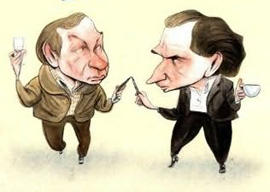
April 06, 2011

Last week we nostalgically suggested that culturally, things might have been better in the past. This week we will nostalgically infer that they might be better elsewhere. Where? In France, of course.
Because media figures must be drawn in broad strokes, let us paint philosopher Bernard-Henri Lévy as the bleeding-heart lefty and novelist Michel Houellebecq as the cynical reactionary. Their international bestseller Public Enemies: Dueling Writers Take On Each Other and the World has just been released in America.
The meeting of the leftist philosopher and the conservative novelist is rather like the meeting of men and women as Musset describes it:
…all men are liars, fickle, false, talkative, hypocritical, arrogant and cowardly, despicable and sensual; all women are treacherous, deceitful, vain, curious and depraved; but there is in the world one thing, holy and sublime, it is the union of these two creatures so imperfect and so hideous.
Adapted to the BHL/Houellebecq letters it would run like this: BHL is talkative, hypocritical, arrogant and cowardly, sententious, didactic without being illuminating, both repetitive and inconsistent, and careless with words”which for a philosopher verges on the criminal, like a surgeon careless with scalpels! Michel Houellebecq is vain, curious, despicable, depraved, and so full of Gallic gall that it leaves little room for anything else…but their exchange is stimulating.
Because it is an actual exchange. Unlike politicians they are not trading blank nonsense, issuing lawyer-proof bleached statements from which nothing can be inferred but a general respect for values and an even more general feeling of hope. And unlike the so-called pundits, they are not simply discharging deaf opinions, the first speaking and then the second, each dumb to the other.
Not only do Bernard-Henri Lévy and Michel Houellebecq write to each other, they also read each other’s answers, and little by little a real conversation unravels.
They start by talking about the intellectual’s role in public life”a talk heavily tinged with paranoia just like in Rousseau’s Reveries of a Solitary Walker, to which they repeatedly refer. On top of the paranoia, the moderns bring a feeling of shame to the role. Houellebecq sees shame as a device for control (“because in our societies, it is important for people to feel ashamed of themselves; it may even be the case that shame has become the fundamental tool for taming”) and Lévy sees it as inherent to the human condition (“the double specter of being nothing and of being nothing other than yourself, of having no place in this world and also of having one, but one that fills you with an even more biting embarrassment and shame”).